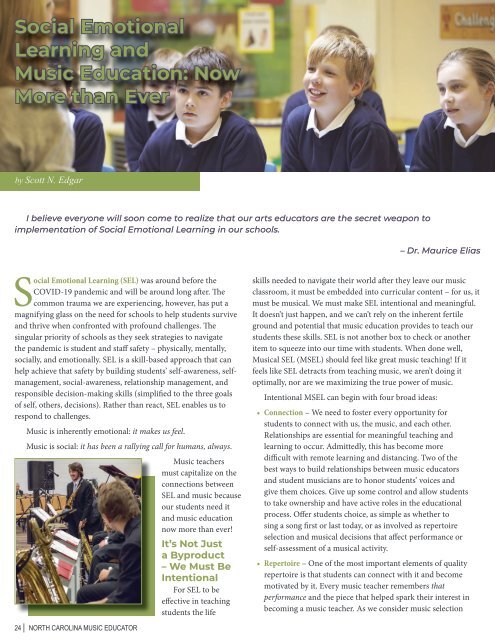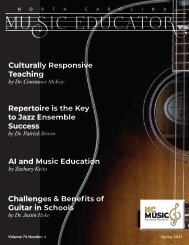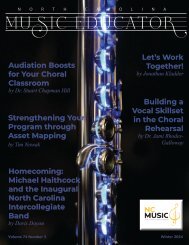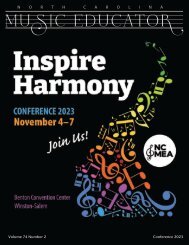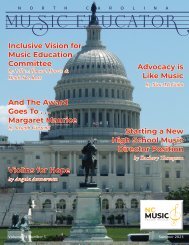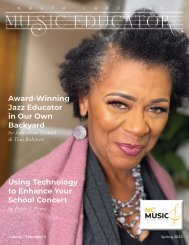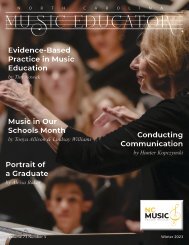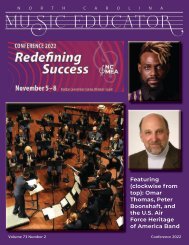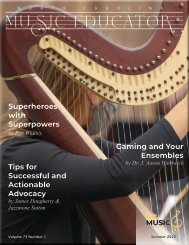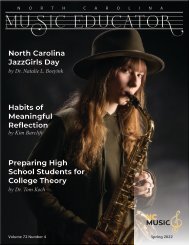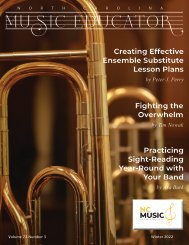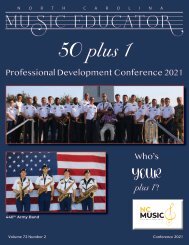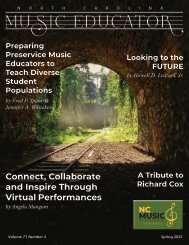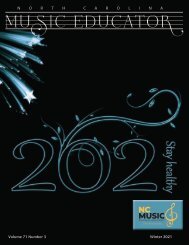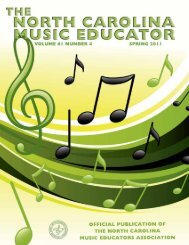North Carolina Music Educator Journal Summer 2021
Professional journal for North Carolina music educators, Summer 2021
Professional journal for North Carolina music educators, Summer 2021
You also want an ePaper? Increase the reach of your titles
YUMPU automatically turns print PDFs into web optimized ePapers that Google loves.
Social Emotional<br />
Learning and<br />
<strong>Music</strong> Education: Now<br />
More than Ever<br />
by Scott N. Edgar<br />
I believe everyone will soon come to realize that our arts educators are the secret weapon to<br />
implementation of Social Emotional Learning in our schools.<br />
Social Emotional Learning (SEL) was around before the<br />
COVID-19 pandemic and will be around long after. The<br />
common trauma we are experiencing, however, has put a<br />
magnifying glass on the need for schools to help students survive<br />
and thrive when confronted with profound challenges. The<br />
singular priority of schools as they seek strategies to navigate<br />
the pandemic is student and staff safety – physically, mentally,<br />
socially, and emotionally. SEL is a skill-based approach that can<br />
help achieve that safety by building students’ self-awareness, selfmanagement,<br />
social-awareness, relationship management, and<br />
responsible decision-making skills (simplified to the three goals<br />
of self, others, decisions). Rather than react, SEL enables us to<br />
respond to challenges.<br />
<strong>Music</strong> is inherently emotional: it makes us feel.<br />
<strong>Music</strong> is social: it has been a rallying call for humans, always.<br />
<strong>Music</strong> teachers<br />
must capitalize on the<br />
connections between<br />
SEL and music because<br />
our students need it<br />
and music education<br />
now more than ever!<br />
It’s Not Just<br />
a Byproduct<br />
– We Must Be<br />
Intentional<br />
For SEL to be<br />
effective in teaching<br />
students the life<br />
skills needed to navigate their world after they leave our music<br />
classroom, it must be embedded into curricular content – for us, it<br />
must be musical. We must make SEL intentional and meaningful.<br />
It doesn’t just happen, and we can’t rely on the inherent fertile<br />
ground and potential that music education provides to teach our<br />
students these skills. SEL is not another box to check or another<br />
item to squeeze into our time with students. When done well,<br />
<strong>Music</strong>al SEL (MSEL) should feel like great music teaching! If it<br />
feels like SEL detracts from teaching music, we aren’t doing it<br />
optimally, nor are we maximizing the true power of music.<br />
Intentional MSEL can begin with four broad ideas:<br />
– Dr. Maurice Elias<br />
• Connection – We need to foster every opportunity for<br />
students to connect with us, the music, and each other.<br />
Relationships are essential for meaningful teaching and<br />
learning to occur. Admittedly, this has become more<br />
difficult with remote learning and distancing. Two of the<br />
best ways to build relationships between music educators<br />
and student musicians are to honor students’ voices and<br />
give them choices. Give up some control and allow students<br />
to take ownership and have active roles in the educational<br />
process. Offer students choice, as simple as whether to<br />
sing a song first or last today, or as involved as repertoire<br />
selection and musical decisions that affect performance or<br />
self-assessment of a musical activity.<br />
• Repertoire – One of the most important elements of quality<br />
repertoire is that students can connect with it and become<br />
motivated by it. Every music teacher remembers that<br />
performance and the piece that helped spark their interest in<br />
becoming a music teacher. As we consider music selection<br />
(at every level), we should always consider how we can<br />
make it personal for our students. MSEL is only as good as<br />
the repertoire it is connected to. <strong>Music</strong> first!<br />
• Experiences – Students must be given<br />
the opportunity to do MSEL. This is the<br />
culmination of connection, repertoire, and<br />
reflection in a musical experience that allows<br />
students to explore, create, contribute, choose,<br />
and encounter music with other students. To<br />
maximize the effect these experiences can have<br />
on students, exploring music that interests<br />
students must be melded with the music we<br />
see value in teaching. These experiences must<br />
be intentional and thoughtful and put on the<br />
same level as we have traditionally placed<br />
performance.<br />
• Reflection – To achieve voice and choice and<br />
to connect students with the music, every<br />
performance, activity, or objective should have<br />
a student reflection component. The process<br />
is just as important as the product and can help unpack<br />
creativity, self-awareness, self-assessment and can support<br />
students’ goal-setting. These reflections often result in the<br />
best responses online, and they give valuable information<br />
as we continue to design in-person and remote music<br />
education. While reflection typically follows an activity,<br />
Students<br />
often rely on<br />
music teachers<br />
and the music<br />
classroom for<br />
security, school<br />
connectedness,<br />
and support.<br />
They need us<br />
now more than<br />
ever.<br />
consider peppering reflection throughout the process so<br />
students can connect and consider the why as they complete<br />
the what.<br />
For safety reasons, performance won’t have<br />
the role it had prior to the pandemic disruption<br />
for some time. We need to adapt our pedagogical<br />
approaches to capitalize on other elements of<br />
music education including creating, responding,<br />
and connecting. Some music educators might<br />
view this as lowering the bar. While I am<br />
confident we will return to focusing on musical<br />
excellence through performance, for now, we<br />
must reconceptualize our standards. We cannot<br />
lower the bar; we need to change the bar and keep<br />
it high.<br />
This adaptation – adjusting the how we teach<br />
music – will allow us to continue to teach music<br />
at a high level and still reach our students. But it<br />
will be different. When we give ourselves space<br />
to prioritize non-performance elements, it makes<br />
room for essential components of music education including<br />
creativity, personal connection, and MSEL.<br />
Reentry into the <strong>Music</strong> Classroom and How<br />
MSEL Can Help<br />
The trauma everyone is feeling as a result of COVID-19 is<br />
24 | NORTH CAROLINA MUSIC EDUCATOR NORTH CAROLINA MUSIC EDUCATOR | 25


